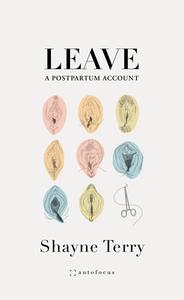 Shayne Terry explores the nuance and complexity of pain and birth in Leave: A Postpartum Account, offering a raw and candid look at her difficult, years-long postpartum recovery. "I have long believed in the power of language to shape our experience," she writes. "What we call things matters." What she calls her birth experience is not to be taken lightly: "traumatic," "hard, with bright, soft spots," "a physical fracture in my life." Moving back and forth across time, Terry speaks around and then directly to the details of her fourth-degree tear when her son "ripped his way into the world," leaving her physically broken in ways she was wildly unprepared for in the weeks and months following the birth of her son.
Shayne Terry explores the nuance and complexity of pain and birth in Leave: A Postpartum Account, offering a raw and candid look at her difficult, years-long postpartum recovery. "I have long believed in the power of language to shape our experience," she writes. "What we call things matters." What she calls her birth experience is not to be taken lightly: "traumatic," "hard, with bright, soft spots," "a physical fracture in my life." Moving back and forth across time, Terry speaks around and then directly to the details of her fourth-degree tear when her son "ripped his way into the world," leaving her physically broken in ways she was wildly unprepared for in the weeks and months following the birth of her son.
The CDC estimates that more than 50,000 women per year--or some 135 per day--suffer dangerous or life-threating complications from "consequences of pregnancy or childbirth," and yet Terry notes how rarely these complications are discussed. There are occasional whispers of tears, stitches, a wound the size of a dinner plate, but these are couched within the love and joy and health of the baby delivered. "The baby is healthy. The baby is beautiful. We love the baby. Words that are true but hide other truths." Terry pours her own truths out onto the page, truths that go beyond a healthy baby, truths that lead her to examine the generational trauma she inherited from her mother and her mother's mother; to understand the deep connection between physical and mental anguish; to place her situation within the context of efforts by some to limit access to reproductive healthcare and maternal supports, like paid leave, all at once. Terry reveals the transformative power of transparency, what it looks and feels like to be honest with oneself and with others about birth and pain and trauma--and the messy, complicated feelings that arise when the three occur at once.
"Birth is a portal that can take us to other births," Terry reflects, and Leave honors this observation, revealing with a boldness and rawness that her one birth is both deeply personal and entirely universal. It is not hard to imagine that Leave must have been cathartic for Terry to write. What is harder to embrace is the realization that it is also cathartic to read, acknowledging what often goes unsaid and unrecognized, for any reader who has given birth, endured pain, or known someone who has (in other words: nearly everyone). --Kerry McHugh, freelance writer
Shelf Talker: A raw and candid account of one woman's long, traumatic recovery from birth and what it offers in our understanding of motherhood, pain, and recovery.

